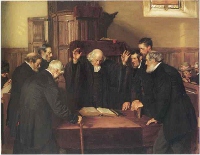A Few Good Men, Not a Few Good Yes Men

January 13, 2014
 I had the pleasure yesterday of administering ordination vows to two new elders at Cornerstone Presbyterian Church (see the photo), an experience enhanced by the knowledge that I am now no longer the youngest member of the session there. Working with The Shadowy Figure Known Only as the Librarian and the Artist Formerly Known as the Session Clerk, among others, I have for too long been the closest link we have to that ghastly aberration known as yoof culture.
I had the pleasure yesterday of administering ordination vows to two new elders at Cornerstone Presbyterian Church (see the photo), an experience enhanced by the knowledge that I am now no longer the youngest member of the session there. Working with The Shadowy Figure Known Only as the Librarian and the Artist Formerly Known as the Session Clerk, among others, I have for too long been the closest link we have to that ghastly aberration known as yoof culture. One part of the ordination service struck home. It was the description of the role of elders in connection to the minister:
[T]hey should have particular regard to the doctrine and the conduct of the minister of the Word, in order that the church may be edified, and may manifest itself as the pillar and ground of truth.'Particular regard': in other words, holding the minister accountable for his doctrine and life is central to what it means to be an elder. And it is encouraging as a minister to know that I have good men who are watching my life and doctrine closely so that the church will be edified and not led astray. What minister who knows his own heart would trust himself to lead a congregation on his own and according to his own wisdom?
The other encouraging aspect of this is that these are not Yes Men. These men were not elected by me: they were elected in a congregational vote by the members of the local church and in which I did not cast a ballot. True, as a session, we had been looking at the congregation for a while to identify potential elder candidates; but the congregation had the right to nominate anyone and also the right to reject anyone we as a session chose to suggest.
Again, I was struck by the transparency of good church government when it works well. Whether one is in a congregational or presbyterian church, the twin issues of transparency and leadership accountability are vital to healthy life. There must be transparent processes whereby the elders and minister can be held to account by congregants. And there must be a culture among the elders whereby the minister is held to account for his life and doctrine. It is not complicated: a decent book of church order and a few good men, elected by the congregation, are all that is needed.
It is also why the parachurch must not supplant the church. Parachurch organisations -- including the Alliance -- tend to be staffed and run by self-selecting groups. Indeed, leadership accountability has been shown in recent years to be perhaps the biggest problem in such groups; and my prediction is that it will continue to be so. True, at the Alliance those of us who write and speak did not invent the organisation -- it predates me by quite some time; and we are accountable not to each other but to the Puppetmaster and to the Board. We have not selected those to whom we answer; they have selected us. But we must never over-reach ourselves and try to exert powerful influence over those to whom we are not accountable in a clear and transparent way. Power and influence in the Christian world must be directly proportional to transparency and public accountability. If not, the result will inevitably tend over time to petty despotism and worrying corruption.
In the meantime, every minister needs good local elders, men whom he has not chosen, who see him each Sunday, who hear him preach and pray, who connect with him during the week, who see how he treats his wife and his children, who observe how he speaks to visitors, who know how he relates to his neighbours, to keep him accountable both to the Word of God and to congregation which he serves. Anything less, anything other, is simply unbiblical and in the long run a recipe for disaster.




